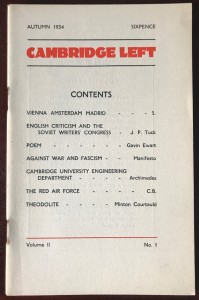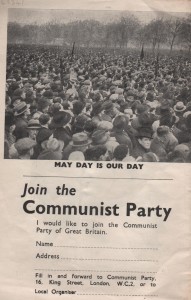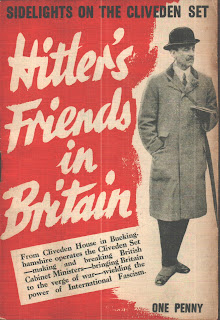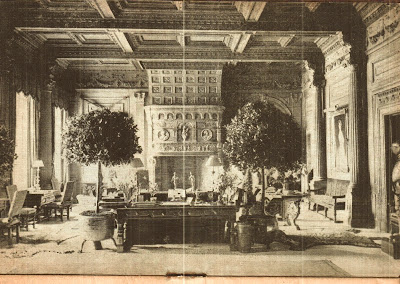Found– a poem in the autumn 1934 issue of the literary and political periodical Cambridge Left. It was titled ‘Theodolite’ and was by one Minton Courtauld (probably a scion of the wealthy family and about 22 at the time. Minton was a family name.) The poem is aimed at W H Auden, Stephen Spender, Cecil Day-Lewis and Rex Warner– all anti-fascist and sympathizers with the Soviet Union and Communism, although some of them became disillusioned. This is not quite MacSpaunday (Macneice, Spender, Auden, Day-Lewis) as Macneice was intellectually opposed to Communism. The periodical has a manifesto against war and fascism and Courtauld’s beef with Spaudwarnerday (if I may) is likely to have been their taunting warlike stance. The ‘L’ referred to is a mystery…
Wystan, Rex, Stephen, Cecil, all of you::
It is now time to discontinue abuse.
The spent bullets from your machine guns are quickly
Building a rampart to protect the enemy.
You are awaiting orders to make an advance movement.
Heavy guns should have found the approximate range.
Those attacking the cathedral will wear gas masks.
So far there have been no casualties.
A concerted attack pushed home at every point.
No mercy now: they will have none if they beat you.
Remember how they tortured L. till they killed him:
That’s what they’ll do to you, if they get you alone.
You must stop sniping now from the gasometer,
It gives away the position and does us no good.
Are you prepared to fight for days without sleeping?
For years without going home to visit your girl?
Are you quite sure that you understand the position?
Visibility poor. Have you a windscreen-wiper?
Are you sure that you know the road now the signposts are gone?
Wystan, Rex, Stephen, Cecil, all of you?







